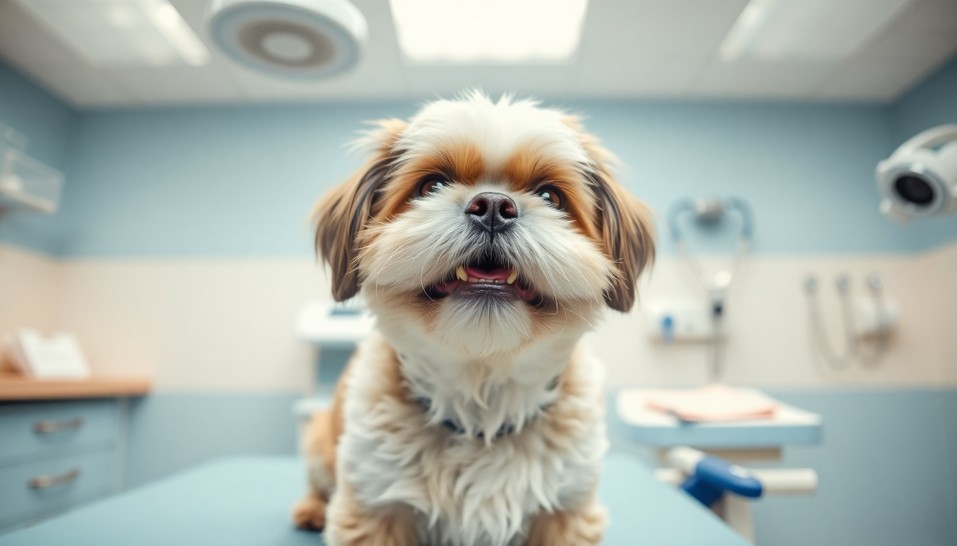Shih Tzu Underbite: Is It Normal or a Problem? Vet-Approved Guide

The Shih Tzu is one of the most beloved toy dog breeds in the world, cherished for its playful nature, expressive eyes, and charming personality. One of the most noticeable physical traits of a Shih Tzu is its underbite. If you’ve ever seen a Shih Tzu flash a cheeky smile with its bottom teeth poking out, you’re familiar with this feature. But many dog owners wonder: Is a Shih Tzu underbite normal, or is it a health concern?
What Is a Shih Tzu Underbite?
A Shih Tzu underbite, medically termed mandibular prognathism, is a dental condition where the lower jaw (mandible) extends beyond the upper jaw (maxilla). This results in the bottom row of teeth becoming visible even when the mouth is closed.
In most Shih Tzus, this underbite is part of their breed standard and contributes to their distinct appearance. The Shih Tzu’s flat face and brachycephalic (short-nosed) skull shape naturally lead to this alignment. While it may appear as a flaw in other breeds, the underbite is often considered a defining trait in Shih Tzus.
Is It Normal for Shih Tzus to Have an Underbite?
Yes, in many cases, it is completely normal. According to breed standards set by organizations such as the American Kennel Club (AKC), a slight underbite is actually expected in Shih Tzus.
It contributes to their characteristic look and is not considered a defect unless it becomes extreme or causes discomfort. However, while a small underbite is typical and even desirable in the breed, it’s crucial for dog owners to monitor it over time.
Causes of a Shih Tzu Underbite
1. Genetic Inheritance
Shih Tzus are genetically predisposed to having an underbite. Breeders have selectively bred dogs with this trait to maintain the breed’s standard look.
2. Skull Structure
As a brachycephalic breed, the Shih Tzu has a short muzzle and a compact face. This structural conformation naturally shifts the jaw alignment, leading to an underbite.
3. Developmental Growth
Some puppies may develop more pronounced underbites as they grow. While early signs may seem mild, growth patterns during the first year of life can exaggerate the condition.
How to Identify an Underbite in Your Shih Tzu
Look for the following signs:
- Lower teeth visible when the mouth is closed
- Jaw misalignment visible from a side profile
- Difficulty chewing or grasping food
- Teeth clashing or uneven wear
- Frequent drooling or bad breath
Potential Problems Caused by Underbites
While many Shih Tzus live healthy lives with an underbite, there are circumstances where it can pose risks.
1. Oral Injuries
Teeth misalignment can cause rubbing against the gums or roof of the mouth, leading to sores or bleeding.
2. Difficulty Eating
Severe underbites can make it harder for dogs to chew or grasp food, potentially leading to weight loss or digestive problems.
3. Dental Disease
Food can become trapped in areas of the mouth that are harder to clean, promoting plaque and tartar buildup.
4. Tooth Damage
Constant grinding or unnatural pressure can result in cracked or worn-down teeth.
When Should You See a Veterinarian?
You should consult your veterinarian if your Shih Tzu exhibits:
- Pain when eating
- Bleeding gums
- Swollen jaw
- Reluctance to chew toys
- Dropping food frequently
A vet will perform a full oral examination and may recommend dental X-rays to assess internal damage or misalignment that isn’t visible externally.
Treatment Options for Problematic Underbites
1. Dental Cleaning and Maintenance
Regular dental cleanings are essential for any dog with misaligned teeth. A vet may recommend annual professional cleanings and daily brushing at home.
2. Tooth Extraction
In some cases, teeth that are causing injury or cannot be aligned properly may need to be removed to prevent pain or infection.
3. Orthodontic Appliances
While rare, canine orthodontics exist and may help correct a functional issue rather than a cosmetic one. This approach is usually reserved for severe misalignment.
4. Specialized Diet
Softened kibble or wet food can help dogs with severe underbites eat more comfortably and avoid injury from chewing hard kibble.
How to Care for a Shih Tzu With an Underbite
Maintain Oral Hygiene
- Brush teeth daily with dog-safe toothpaste
- Provide dental chews that promote gum health
- Schedule routine dental check-ups
Observe Eating Behavior Watch how your dog eats. If they’re reluctant to chew or drop food often, this may signal discomfort.
Choose the Right Toys Avoid toys that are too hard, which can break or damage protruding teeth. Opt for soft or rubbery chew toys.
Are There Benefits to a Shih Tzu Underbite?
While the term “underbite” might sound negative, in the case of the Shih Tzu, there are a few quirky advantages:
- Breed Authenticity: A slight underbite enhances the breed’s appearance according to show standards.
- Cute Factor: Many owners find the underbite adds to the dog’s charm and unique smile.
- No Health Impact (in Mild Cases): For most Shih Tzus, a minor underbite doesn’t interfere with daily life.
Can You Prevent an Underbite?
You can’t prevent a genetically-inherited trait. However, ethical breeding practices can reduce the risk of extreme cases.
If you’re choosing a puppy, ask the breeder whether the parents have significant underbites or bite issues. Reputable breeders work to maintain breed standards without compromising the animal’s health.
Long-Term Outlook
The majority of Shih Tzus with underbites will never experience pain or complications. With the right care and regular vet visits, they can enjoy a full and happy life. That said, remaining observant is key.
You should always monitor for changes in behavior, chewing ability, and oral health. Catching issues early can prevent discomfort and expensive treatments down the road.
Conusion
A Shih Tzu underbite is more than just a quirky facial feature—it’s part of what makes this breed so beloved. In most cases, it’s completely normal and not a cause for concern. However, like all physical traits, it should be monitored with care.
If you’re ever in doubt, consult your veterinarian. With regular check-ups and good dental hygiene, your Shih Tzu can live a healthy, happy life with their signature smile proudly on display.
Keep your Shih Tzu smiling—know the facts about underbites.




